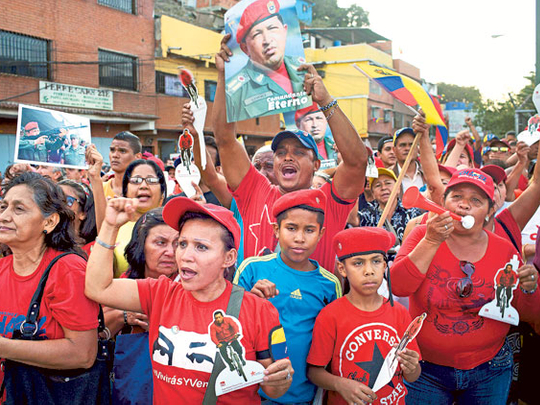
Caracas: Venezuela marked the first anniversary of Hugo Chavez’s death on Wednesday with a blend of solemn ceremonies, clashes and a break in relations with Panama over protests dogging his successor’s presidency.
President Nicolas Maduro led a military parade with tanks, fighter jets and elite troops before a ceremony next to his mentor’s marble tomb in former barracks that sit atop a Caracas slum.
Soldiers fired a cannon salvo at the hour of Chavez’s death, 4.25pm, from the Mountain Barracks that have become a pilgrimage site for his fervent leftist supporters.
But the commemorations were marred by new clashes in the capital’s eastern middle-class district into the late evening, hours after hundreds of anti-government students marched in the latest show of discontent in a month of demonstrations.
About 200 national guard troops, backed by six armoured trucks, launched tear gas and fired birdshot at dozens of hard-line protesters, who lobbed firebombs after blocking streets with concrete blocks and burning trash.
Some people threw stones from buildings, prompting the national guardsmen to fire tear gas into high-rises.
There were no immediate reports of injuries or arrests.
At least 18 people have died since early February during anti-government protests that Maduro has denounced as a US-backed plot by “fascists” to overthrow him.
The protests have posed the biggest challenge yet to Maduro’s young presidency, though analysts say his government remains sturdy enough to withstand the pressure.
Standing next to the Chavez tomb, Maduro railed against the Washington-based Organisation of American States and declared that he was breaking relations with Panama over its request for an OAS meeting about Venezuela’s unrest on Thursday.
“Nobody will conspire with impunity to ask for an intervention against our fatherland. Enough!” Maduro thundered as leftist presidents Raul Castro of Cuba, Daniel Ortega of Nicaragua and Evo Morales of Bolivia looked on.
He called Panama’s President Ricardo Martinelli a “lackey” of the United States.
The small nation’s foreign ministry rejected the “unacceptable insults,” saying they should not serve as a “smoke screen that aims to deny (Venezuela’s) own reality.”
Alleging another domestic plot, Maduro announced an unspecified number of arrests of people he accused of trying to commit sabotage on bridges and highways.
Outside, residents of the January 23 slum flew kites, launched fireworks and fired gunshots in the air to commemorate the former lieutenant colonel they call their “eternal commander”.
The west side’s celebration of Chavez contrasted with the anger felt in the wealthier east side of Caracas, where students and the opposition have held protests almost daily over the country’s runaway crime, food shortages and soaring inflation.
“The protests are a whim by the opposition to make the government fall, but they won’t succeed,” declared Dubraska Graterol, a 24-year-old government worker at the military parade.
After 14 years in power, Chavez lost his battle with cancer on March 5, 2013, leaving behind a country sharply divided by his oil-funded socialist revolution. He was 58.
His image figures prominently on billboards and walls throughout Caracas, while his speeches can be heard on national TV or speakers blasting from the January 23 slum.
Chavez retains a cult-like following among his supporters. Maduro himself refers to his mentor’s “physical departure,” suggesting that his spirit lives on.
While the protests have concentrated on the capital’s east side, the western slums remain government bastions. Some “Chavistas” say Maduro’s fate is linked to the revolution that Chavez started.
“As long as he fulfils the legacy that he (Chavez) left behind, I say that people will be satisfied and happy. If he doesn’t keep it up, he won’t go very far,” said Angela Sandoval, a 35-year-old resident of the January 23 slum.
Chavez’s handpicked successor was elected by a razor-thin margin in April, defeating opposition leader Henrique Capriles, who cried foul and refused to recognise the results.
Though the government is not as strong as a year ago, “there is no counter-power that can be considered enough to transition to another regime,” Central University of Venezuela professor Carlos Romero told AFP.
The opposition plans to lead a new protest on Saturday.
“We are protesting because one year after Chavez’s death, we have a president with many failings,” said Jesus Vielma, a 21-year-old engineering student.












